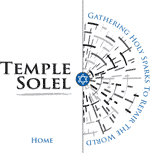One of the things that has really set this year's Republican presidential primary campaign apart from primary seasons in years past has been the preponderance of debates. In case you haven't been keeping track, there have been 17 so far (the first one took place on May 5, 2011!). And the unbelievable thing is that Americans continue to tune in in droves! Say what you will about our broken political process, but it does seem as if Americans are genuinely interested in listening to what these candidates have to say.
Interestingly, this week's Torah portion - Parshat Va'eira from the middle of the Book of Exodus - shows us a Moses who struggled in a way that this year's Republican candidates apparently don't have to. Moses was concerned that the Israelites wouldn't listen, or pay attention, to what he had to say.
We read that upon returning to Egypt, Moses "spoke to the Children of Israel [and informed them that he had come to free them from slavery] but they did not heed Moses, for they were exhausted from their labor. So the Holy One spoke to Moses, saying 'Come, speak to Pharaoh, king of Egypt instead...that he might send the Children of Israel from his land.' Moses replied to the Holy One saying: 'Behold, the Children of Israel have not listened to me....so why should Pharaoh? For I have uncircumcised lips!" (Exodus 6:9-12)
The phrase about "uncircumcised lips" has puzzled our rabbis and commentators for more than 2000 years. What does it mean?
I'm quite fond of the insight offered here by the Sfat Emet of 19th century Poland. The Sfat Emet notes on this passage that: "If the Israelites refuse to listen to their leaders, their leaders cannot serve as their spokesmen...and they thus become 'of uncircumcised lips.' Only if there are those who are prepared to listen is it possible to speak, because the leader's power is derived from the people."
There are common-sensical political ramifications to this insight. Even though viewers are tuning in in record numbers to watch the debates, we know that they are not necessarily interested in listening to everyone on the stage. Consider the candidates that were absent from last night's debate in South Carolina that featured Romney, Paul, Santorum, and Gingrich. There was no sign of candidates Bachmann, Cain, Huntsman, Johnson, Pawlenty, or Perry! They've dropped out of the race because they were polling in the single digits: the statistical evidence that few people were interested in hearing what they had to say.
The Sfat Emet's commentary goes on, by exploring the fact that neither the Israelites nor Pharaoh listened to Moses: "Therefore, had the Israelites at least listened to Moses, he would have had the power to speak to Pharaoh and to influence him. Here, though, the Israelites had not been willing to listen to him and so he had become 'of uncircumcised lips.' Thus Moses asked: Why should Pharaoh listen to me?"
Speaking and listening....the basic activities that make the world go round.
Our tradition is suggesting here that if the Israelites had been better listeners, Moses would have been a more effective speaker with Pharaoh. And if Moses had been a more effective speaker...then maybe the Israelites would have been freed earlier, and both the Israelites slaves and the Egyptians (victimized by the subsequent plagues) would have all suffered a lot less.
The Sfat Emet also suggests some important lessons for our own lives today.
In the realm of Jewish ethics, reams and reams have been written on the proper Jewish way of speaking. There are whole legal discourses on the subject of gossip alone!
But there has been comparatively little written about sacred - or mindful - listening.
It seems to me that mindful listening has two components to it. On one level, there's an ethical component. Think about how vitally important it is for us to be good listeners to one another...because the person you are talking to might actually be crying out for help. They might not use those words exactly. But they might be expressing it nonetheless. And we can only pick up on that message, and respond accordingly, if we are listening truly, deeply, and carefully to what someone else is saying to us.
But there's also a spiritual component to sacred listening. Check out, for example, this link...which encourages us to listen more carefully to the sounds of the world around us by way of a guided meditation. Consider how much more appreciative we might become of the beauty of the natural world, if we just became better listeners. (It's one reason that I love going to the zoo so much....not just because of the animals and the stunning landscaping...but because there's such a rich aural tapestry to encounter when you go to the zoo.)
Martin Buber, the great 20th century Jewish philosopher married the spiritual and ethical components of sacred listening in his masterwork I and Thou. In it, he suggests that if we are truly present with others in an ethical way (i.e. deeply listening to what they have to say/being there for them, even as they are present for us)...then the resulting sense of deep, though temporary, connection between the two people is - for Buber - the presence of God (which he called the "Eternal [or Everpresent] Thou").
All of this should serve as a weighty reminder: that our words matter....and that our ability to hear the words of others might matter even more! We shouldn't just mind our words. We should mind the way we listen as well.
Shabbat Shalom.
Subscribe to:
Post Comments (Atom)





No comments:
Post a Comment